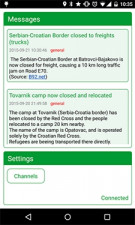
A team of Hungarian activists has developed a free smartphone app to help refugees cut through the confusion and chaos of the constantly-changing rules and procedures in their arrival countries.
InfoAid sends users the latest available news and information on topics such as changing laws, asylum procedures, border closures, and bus departure points and destinations. Available on Android smartphones, the app offers six languages - Arabic, English, Farsi, Hungarian, Pashto, and Urdu - and claims to have no access to users' personal data.
The more translators InfoAid can find, the more languages the team can add, says Nina Kov, a primary member of the InfoAid team, adding that Greek is the next in line.
Kov says the app was developed in response to a lack of accurate and reliable information - often purposeful - provided to refugees by government authorities.
Earlier this month, Hungarian authorities led hundreds of refugees to believe they were boarding a train bound for Western Europe, only to attempt to offload them at an overcrowded refugee camp outside Budapest.
Taking to tech
InfoAid is one of many citizen-driven tech solutions attempting to aid the hundreds of thousands of refugees and migrants flooding into Europe from war-torn and poverty-stricken countries in Africa and the Middle East, in Europe's biggest refugee crisis since World War II.
Earlier this year, Syrian computer programmer and refugee Mojahid Akil grabbed headlines with Gherbtna - which in Arabic refers to exile, loneliness, or a feeling of foreignness - a smartphone app helping Syrian refugees adapt to life in Turkey.
Gherbtna helps users find vital services, such as hospitals or schools, or navigate critical legal procedures, such as registering a birth or death. The app also aims to help users deal with homesickness, for example by helping them locate restaurants serving Syrian food.
German Web site Refugees Welcome functions like an "Airbnb for refugees", linking German and Austrian residents with spare rooms in their homes to refugees looking for permanent accommodation.
Aiming to combat misinformation and stigma surrounding refugees and their motives for attempting to build new lives in Europe, the UN Refugee Agency developed My Life as a Refugee, an app introducing users to the tough decisions typically encountered by refugees fleeing war or persecution.
Share